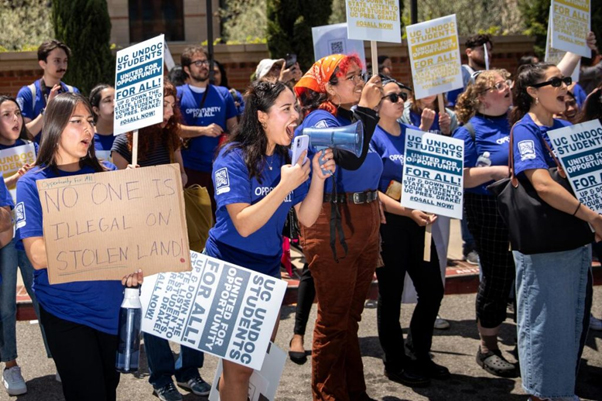
Empowering Undocumented Residents in the Workforce
For years, California has been a pioneer in enacting progressive legislation to support undocumented residents, such as granting driver's licenses. Now, the state's higher education system is taking a ground breaking step by considering the employment of undocumented students.
The University of California Regents Leading the Way
After responding to student demands for an innovative hiring policy catering to undocumented immigrants, the University of California (UC) regents are on the cusp of a self-imposed deadline of November 30. Their ambitious goal is to establish UC as the first public institution that commits to hiring both students and staff without discrimination based on their immigration status. As the deadline approaches, activists intensify their efforts to exert public pressure on the regents, urging them to act promptly and collaborate with immigrant students in crafting the plan.
The 'Opportunity for All' Campaign
The "Opportunity for All" campaign, initiated by Jeffry Umaña Muñoz, a senior at the University of California, Los Angeles (UCLA), aims to challenge the notion that federal law restricts state agencies like UC from employing undocumented students or graduates. Advocates argue that this approach will unlock the full potential of these graduates, addressing the unique challenges faced by undocumented students on UC's ten campuses.
Shaping a New Legal Perspective
UC's potential policy shift challenges the conventional understanding of federal restrictions on hiring undocumented individuals. Supported by immigration legal scholars, the campaign argues that the 1986 Immigration Reform and Control Act (IRCA), which prohibited hiring undocumented workers, does not apply to state government entities like public university systems. They base their argument on the absence of explicit language in IRCA binding states, aligning with the U.S. Supreme Court's precedent on Congress's regulatory powers over state governments.
Interest and Legal Uncertainty
UC's move has not only captured the attention of activists within California but also from states like New York, Texas, Washington, and Florida. The specific form of UC's hiring policy remains uncertain, with challenges including the verification of identities for potential undocumented workers, a task currently governed by Form I-9, a requirement for employers under the 1986 law.
While legal challenges may arise, advocates remain confident in their legal backing and are prepared to defend their policy in any court.
The "Opportunity for All" campaign has gained significance amid legal uncertainties surrounding the Deferred Action for Childhood Arrivals (DACA) program. The future of DACA remains to be determined, and many high school graduates are ineligible for it due to its original criteria.
The policy's impact on current UC students remains to be seen, but it could have profound implications. In California alone, over 44,000 undocumented students in higher education are ineligible for DACA benefits. Nationally, approximately 250,000 undocumented students are enrolled in college, with an additional 120,000 high school graduates each year.
Advocating for Equitable Opportunities
Although Congress has faced obstacles in passing immigration measures, states have taken steps to reduce barriers for undocumented populations in higher education and employment. California, for example, has offered in-state tuition to undocumented students since 2000. Despite this, many undocumented students in the state still struggle with college costs due to the lack of federal financial aid and employment authorization.
Abraham Cruz, an undocumented UCLA senior, highlights the need for employment opportunities within the university system to alleviate financial challenges and provide access to graduate school.
Meeting a Looming Deadline
Despite the legal uncertainties surrounding DACA, UC's supporters aim to implement the new hiring program before the 2024 election cycle begins, making it more resilient to potential changes in the White House administration.
However, as the plan's release date approaches, the working group has yet to share details or engage directly with student organizers, causing disappointment. These organizers stress the importance of involving students with firsthand knowledge of the challenges undocumented populations face.
In a statement, the University of California Office of the President acknowledges the difficulties faced by undocumented students ineligible for DACA and expresses its commitment to creating equitable employment opportunities. The working group remains open to student feedback as it continues its work.
Activists persist in pursuing an inclusive hiring plan by the November deadline, considering it a pivotal step toward their goal. As Karely Amaya Rios, a second-year public policy master's student at UCLA and an undocumented student organizer, aptly says, "The fight isn't over until the first undocumented student receives their first paycheck because of Opportunity for All. Until then, they have a lot of room to back out."




